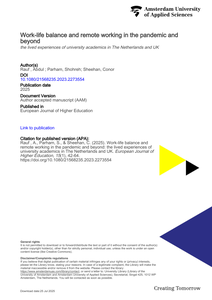This research report contains the findings of an international study consisting of three online ‘living’ surveys. The surveys focused on how the COVID-19 pandemic has impacted sign language interpreters’ working practices, how this was experienced by them, and how digital disruption caused by the pandemic is impacting and innovating the sign language interpreting profession. The study was carried out between April 2020 and July 2020; the largest contingent of respondents over all three surveys were from the U.S., followed by the UK, the Netherlands, Germany, Finland and Belgium. Respondents commented that the crisis will probably accelerate the need for remote interpreting training in interpreter training programs. Another resurfacing issue was the perceived need for sign language interpreting students to have face-to-face practice and live mentoring. Respondents commented on what benefits they thought remote interpreting might bring to the table, both for themselves and for deaf people. In general, the most significant benefits that were mentioned were flexibility and the possibility to improve efficiency and availability of sign language interpreting services. Notwithstanding these benefits, a significant number of respondents claimed that remote interpreting is more stressful than face-to-face interpreting and requires a heavier cognitive load.
DOCUMENT

This Work-in-Progress Innovate Practice Short Paper is concentrated around online teaching and learning and especially focused on the didactics in remote labs. In a remote lab, the lab equipment or instruments are geographically atanother place than the student (and/or lecturer) himself. Learning will take place through the internet. Insights from online teaching and learning help to define what is needed in the special case of teaching and learning in remote labs. Feedback and interaction remain key factors for effective learning. Typesof interaction in remote labs are: student-lecturer-, studentstudent-, student-content-, and student-interface interaction. These forms of interaction should be worked out when setting up a remote lab environment for students, taking onlineengagement into account. The purpose is to come with an overview of didactical methods for teaching- and learning in remote labs.
DOCUMENT
Poor work-life balance (WLB) has been linked to negative outcomes such as increased stress, anxiety, depression, and a perceived reduction in the overall quality of life. At an institutional level, these may include lowered employee commitment and decreased productivity at work. The advent of COVID-19 has necessitated fundamental alterations to work experience and the ways in which WLB may be perceived. This phenomenological study employed qualitative, in-depth interviews to explore higher education academics’ lived experiences of remote working and how they perceived this had impacted their well-being (WB) and WLB. Using purposive samplings, respondents were drawn from HE sectors in the Netherlands, and the UK. The findings offered an understanding of how remote and hybrid teaching delivery during the pandemic affected academics’ actual experiences of WB and WLB. These findings serve to enhance policymakers’ understandings of significant occupational health and WB issues within a post-pandemic education service paradigm.
DOCUMENT

Within this interdisciplinary project, we explore the integration of open-source databases, location-based gaming, and immersive storytelling to improve cultural heritage dissemination, interpretation and understanding of European values among younger target audiences. The students develop a game prototype which will be tested with the target audience during the project. The game is aimed to be implemented at cultural heritages sites along the heritage route of St Martin. The learning objective is to foster digital expertise, remote and virtual working proficiency, and the development of an interdisciplinary working attitude in a joint course setup of virtual workshops and MOOC-based lectures.